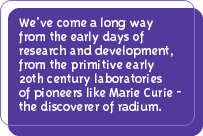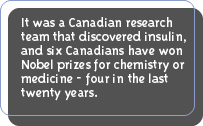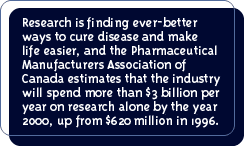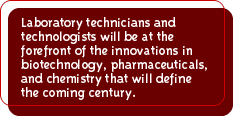

 |
I've
got just one word for you kid: plastics.
Okay,
I've actually got a lot of words: chemistry, bioscience, genetic engineering,
pharmaceuticals, metallurgy, nanotechnology… the list goes on and on.
We've come a long way from the early days of research and development,
from the primitive early 20th century laboratories of pioneers like
Marie Curie - the discoverer of radium.  She
opened up the frontiers of human knowledge, helped introduce the X-ray
machine and made the first radiation therapies for cancer possible.
Ironically, her discoveries cut her life short because radiation was
so poorly understood in her day. She
opened up the frontiers of human knowledge, helped introduce the X-ray
machine and made the first radiation therapies for cancer possible.
Ironically, her discoveries cut her life short because radiation was
so poorly understood in her day.
Today,
on the edge of the 21st century, we are dependent on science for everything
from the most mundane everyday items to the most fantastic innovations.
Canadians enjoy one of the highest standards of living in the world,
at least in part due Canada's hard-working researchers. Indeed, Canada's
laboratories have been world leaders for decades. It was a Canadian
research team that discovered insulin, and six Canadians have won Nobel
prizes for chemistry or medicine - four in the last twenty years.
But
it goes farther than that. You hold the work of scientists, researchers,
technicians, and technologists in your hands every time you take a sinus
decongestant or a headache tablet. You can find their efforts in everything from water-resistant clothing to low-emission gasoline and
calorie-free soft drinks.
everything from water-resistant clothing to low-emission gasoline and
calorie-free soft drinks.
It
is here, in the realm of everyday life, that the laboratory's impact
is felt most profoundly. If we (arguably) live the good life, it's because
we live in an age when ideas regularly become reality and formulas become
products. In our science-dependent world, the laboratory is just one
part of the production process and, as production grows, so do the labs.
The
products of labs - like plastics - are everywhere from food packaging
to artificial heart valves. We can't get enough of it and, in Canada,
the plastics industry alone grew from $1.89 billion in 1984 to $3.5
billion in 1997. The chemical industry is also a giant, producing products
as diverse as pesticides, cleaning solutions, adhesives on the back
of sticky notes, and adhesives that hold wings on jumbo jets. The widespread
use of chemicals is not without controversy, but many would argue that
the invention of such basic products as laundry detergent and refrigerants
radically changed society forever.
Other
research-intensive industries have experienced equally phenomenal growth.
Since Ottawa passed the Patent Drug Act of 1992, the pharmaceutical
and biotechnology industries have gone through the roof. When geneticists
in Scotland successfully cloned a sheep, it became clear that there
was almost nothing that science could not do. Cloning  and
genetic engineering have since become controversial issues of public
policy, stirring heated debate across society. and
genetic engineering have since become controversial issues of public
policy, stirring heated debate across society.
Research
is finding ever-better ways to cure disease and make life easier, and
the Pharmaceutical Manufacturers Association of Canada estimates that
the industry will spend more than $3 billion per year on research alone
by the year 2000, up from $620 million in 1996. That research, however,
requires skills and manpower, and Canadian chemical, pharmaceutical,
and biotechnology firms have an insatiable hunger for skilled workers.
Pharmaceutical company employment alone increased by 23 percent between
1988 and 1996, but even that growth rate has been insufficient to meet
current needs.
The
simple fact is that there is a severe and pressing skills shortage in
Canadian research-intensive industries. They have grown so quickly and
their research and innovation have so rapidly accelerated that there
just aren't enough people for all of the positions that need to be filled.
Some 224 Canadian biotechnology companies employed 11,000 people in
1996. That year, a survey found that these companies expected to add
a total of 4,000 scientific, technical, management, and marketing jobs
by the year 2000.
This
trend is expected to increase steadily into the 21st century. Experts
agree that biotechnology won't just be one of the leading industries of the dawning century, it will be the leading
industry. The start made with cloned sheep, transgenic goats, and miracle
drugs that can control and perhaps even cure this century's most devastating
plagues, will lead to innovations that may unlock the secrets of life
itself. Laboratory technicians and technologists will be at the forefront
of the innovations in biotechnology, pharmaceuticals, and chemistry
that will define the coming century. Far removed from the media cliché
of the scheming mad scientist, the laboratory will be the workplace
of the 21st century. It is there that you will find the careers of the
future.
of the leading industries of the dawning century, it will be the leading
industry. The start made with cloned sheep, transgenic goats, and miracle
drugs that can control and perhaps even cure this century's most devastating
plagues, will lead to innovations that may unlock the secrets of life
itself. Laboratory technicians and technologists will be at the forefront
of the innovations in biotechnology, pharmaceuticals, and chemistry
that will define the coming century. Far removed from the media cliché
of the scheming mad scientist, the laboratory will be the workplace
of the 21st century. It is there that you will find the careers of the
future.

|